

Tao Te Ching
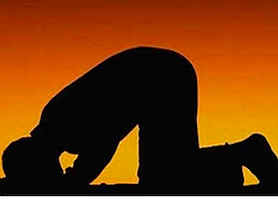
Islamic (الإسلام) Lineage
Though not such a good reputation in the world right now and – like Christianity – carrying forward a history of intolerance, superstition, and mindless violence; Islam also holds claim to some of the world’s finest inventions, advancements in science, medicine, mathematics, poetry and golden age periods of enlightenment, high philosophy, compassion and innovation. Already the world’s second largest religion with 1.7+ billion followers and the fastest growing of the largest religions (Bahá'í fastest during last 100 years), Islam’s influence is powerful and only ignored at the West’s peril. The Sufi branch comes closest our lineages of doubt, understanding the sense and not just the words, the wisdom beyond belief.
People (38)
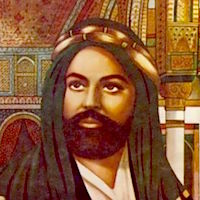
Muhammad محمد; محمد;
570 – 632 CE
Gfted political leader, sage lawmaker, just judge, sincere devotee of integrity; Muhammad was praised by Leibniz, Rousseau, Napoleon, and Thomas Carlyle but Voltaire thought of him as a symbol of fanaticism and called him "a sublime and hearty charlatan.” Although his integrity can be argued, his influence is indisputable. Founder and prophet of Islam, he launched a political and religious revolution that rapidly transformed a poverty-drenched Arabia from a desert of motley, contentious tribes into a force that within 100 years conquered half the Mediterranean world, Byzantine Asia, all of Persia and Egypt, and most of North Africa. A simple ascetic in most ways, he used eye shadow and perfume, dyed his hair, and kept an active harem. Building on the Zoroastrian, Jewish, and Christian traditions; he described elaborate visions of both heaven and hell that forged a unified, monotheistic tradition that unified the Arabs, spread throughout the world, and is still a potent influence today.
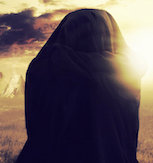
Zainab, Sayyeda Zaynab bint Ali زينب بنت علي
626 – 681 CE
Grand-daughter of the Prophet Muhammad, daughter of revered leader Ali ibn Abi Talib (regarded by Shia as the most important figure after Muhammad, by Sunnis as the greatest warrior champion of Islam, and by Sufis as the originator of their lineage; his legacy split Islam into Shia and Sunni), effective political leader, and one of the most admirable people in early Islam; Zainab - famous for her wisdom, strength and patience - is a rare instance of reverence for both Sunnis and Shi’as. Called the "Hero of Karbala,” she endured physical pain and mental torture to stand up against tyranny, speak the truth, and set Islam on a more just and compassionate course. In Iran today her birthday is known as Nurse's Day.
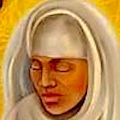
Rabia Basri رابعة العدوية القيسية (Rābi‘a al-‘Adawīyya)
714 – 801 CE
Muslim mystic, “queen of saintly women,” and most important early Sufi poet; Rabia Basri rose from the poverty and slavery of her youth to become the most famous and influential Sufi woman of Islamic history known as “the queen of saintly women.” She had many disciples and became an important influence on the leaders of her time as well as an early voice against spiritual materialism and Islamic patriarchy. She taught a doctrin of Divine Love known as Ishq-e-Haqeeqi that is still practiced today and emphasized spiritual practice without desire for reward or fear of punishment.

Ziryab أبو الحسن علي ابن نافع, زریاب (Abu l-Hasan, “Blackbird”)
789 – 857 CE
Singer, poet, polymath, freed slave, teacher, and one of the greatest influences on world culture; Ziryab’s name is almost unknown in most of the world although the traditions and styles he initiated are commonplace. He invented and popularized the early form of toothpaste, the three-course meal, asparagus, the use of tablecloths, wearing hair in bangs, and using glass containers for drinks. Founder of the 500-year Andalusian music tradition, he laid the early groundwork for classic Spanish music, revolutionized the musical instrument design that became the lute, and created a musical style that influenced European minstrels, troubadours, and the course of European music.
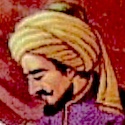
Al-Kindi (Abu Yūsuf Yaʻqūb ibn ʼIsḥāq aṣ-Ṣabbāḥ)
801 – 873 CE
While European countries were still stuck in the dark ages of almost universal superstition and ignorance, Al-Kindi - knows as “father of Arabic philosophy” - precipitated the “Moslem Enlightenment,” one of the true golden ages of human history, a time that threw off its dogmatic shackles of uncritical belief and advanced science, direct experience unfettered by external sources, understanding of the sense and not just the words. A famous historian, physician, polymath, musician and mathematician; he brought Hellenistic wisdom into the Muslim world and shocked his contemporaries by appreciating Christianity.
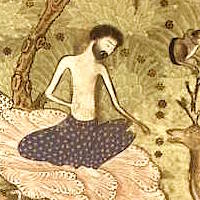
Abu Yazid al-Bisṭāmī بایزید بسطامی
804 – 874 CE
Famous Sufi, ”King of the Gnostics,” forefather of ecstatic Islamic mysticism; Abu Yazid disavowed excessive asceticism and changed the course of Sufism by shifting the emphasis from discipline, obedience and piety to direct experience and “self-annihilation in the Divine Presence.” An active shrine to him in Bangladesh was built and has been used since 850 CE and he remains an important lineage holder in thelargest Sufi brotherhood, the Naqshbandi.
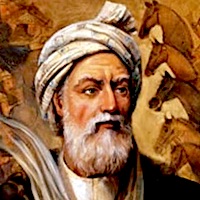
Ferdowsi فردوسی (Abul-Qâsem Ferdowsi Tusi)
940 – 1020 CE
"undisputed giant of Persian literature"
Philosopher, poet, and one of the world's most influential literary figures; Ferdowsi wrote what became Iran's national epic as well as history's longest poem written by a single poet. Considered the "father of the modern Persian language," he influenced all the writers who followed him, regenerated the Persian language, and revived many cultural traditions.
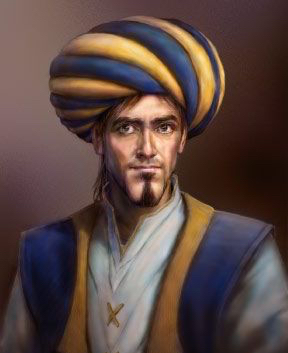
Alhazen بوعلی محمد بن حسن بن هیثم (Ibn al-Haytham)
965 – 1044 CE
One of the most famous and influential Iraqis, philosopher, engineer, astronomer, animal psychologist and one of the first theoretical physicists,; Alhazen understood, used, and promoted the scientific method 200 years before Renaissance scientists. Well-known and honored as "The Physicist" in medieval Europe and writing more than 200 books, he made huge contributions in the fields of optics, astronomy, mathematics, visual perception, and the scientific method. His work on a magnifying lens laid the foundation and inspiration for Roger Bacon and friends’ creation of microscopes and the telescope. He was the first to describe how vision occurs as well as the camera obscura effect on which all photography depends. Apostle of critical thinking and skepticism, he advocated becoming “an enemy of all we read, attacking it from every side.”
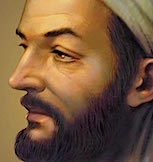
Avicenna أبو علي الحسين بن عبد الله بن الحسن بن علي بن سينا (Ibn-Sīnā)
980 – 1037 CE
Persian polymath, spur to the Islamic Golden Age, poet, doctor, scientist, philosopher and one of the most significant thinkers and writers of his time; Avicenna wrote over 450 books one of which became the standard medical text for European universities up until as late as 1650. With influence from Plato and Aristotle, he clarified the distinction between the words and the sense, taught a spiritual path beyond motivations of hope and fear, reconciled the conflict between reason and faith, and his works according to Will Durant, “mark the apex of medieval thought and constitute one of the major syntheses in the history of the mind.”
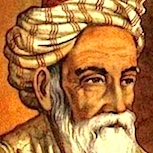
Omar Khayyám
1048 – 1131 CE
Persian Astronomer-Poet, prophet of the here and now
In the west most famous for his poems but Omar Khayyam was also a political advisor, “philosopher of the world,” one of the most influential scientists of his era, “one of the greatest mathematicians of medieval times,” and “without equal in astronomy and philosophy.” A prophet of the here and now, mystical Sufi teacher and free-thinker who rejected theology; he reformed the Persian calendar to a form more accurate than our own today, wrote the most important until modern times book on algebra as well as many others on astronomy, geography, and mechanics. His poems—known as the Rubáiyát—not only rejected Islamic belief and Christian morality, but the nature of religion itself.
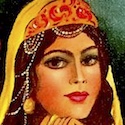
Arwa al-Sulayhi (Al-Malika al-Ḥurra)
1048 – 1138 CE
The stellar example in Muslim history of an independent queen; Arwa ruled Yemen, was the greatest leader during the Sulayhid Dynasty, and was - for the first time in the entire history of Islam - a woman given the title of hujja, the highest status in Islam. Extremely beautiful, intelligent, scholarly, brave, and powerful; she studied science, poetry, history, completed practical and beneficial infrastructure projects, supported agriculture, and built many schools. Her direct lineage continues today in both Yemen and India.
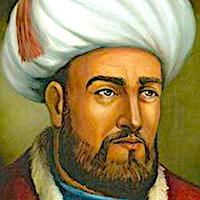
Al-Ghazali أبو حامد محمد بن محمد الطوسي الغزالي (Abu Hamid Al-Ghazali)
1058 – 1111 CE
Philosopher of Sufism
Legal and theological scholar, rationalist, spiritual philosopher, and Sunni mystic; Al-Ghazali became known as a Mujaddid, a once-in-a-century Muslim "renewer of the faith." Believing that the original Islamic teaching quickly became corrupted, he worked to bring the original wisdom back into awareness and—as a side-effect—brought a critique of the Aristotelian approach that facilitated the advancement of European science. He helped integrate Sufism into mainstream Islam and his teaching became a profound influence and foundation for Islamic business ethics and practice.
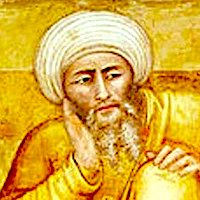
Averroes, Ibn Rushd ابن رشد
1126 – 1198 CE
Polymath, famous Islamic philosopher and scientist, theologian, and physician; Averroes took the position that the Koran and sacred writings were allegories and not to be taken literally. Arguing for an understanding deeper than just the literal meaning of texts, he popularized Aristotle and started a major Jewish and Christian philosophical movement but didn’t become influential in the Muslim world until the 19th century. In fact, during his lifetime, all his books that could be found were burned, he was removed from his positions, and exiled. Dante described him as he "who made the Great Commentary,” Chaucer listed him as a great medical authority, Raphael painted him into a fresco in the Apostolic Palace in the Vatican that depicts major philosophers, Borges featured him in one of his books, and a plant genus, a lunar crater and an asteroid were named after him.
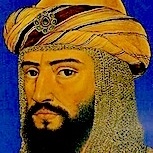
Saladin صلاح الدين يوسف بن أيوب (An-Nasir Salah ad-Din Yusuf ibn Ayyub)
1137 – 1193 CE
The most famous Kurd in history, Saladin’s Sun-Tzu-like strategy, success during the Crusades, and his conquering of Jerusalem have become a symbol for the Arabian struggle against the West. His eagle symbol was adopted by Egypt, the UAR, Iraq, Libya, Palestine, and Yemen. During times of deep European corruption and savagery, his tolerance, generosity, and justice - although not often emulated - have also become an important example for modern times. Respected as a chivalrous knight by Christian lords and European culture for hundreds of years, he dedicated himself to the happiness of people, gave away much of his personal wealth, and faithfully honored his agreements.

Ibn' Arabi Ibn 'Arabi
1165 – 1240 CE
“the foremost spiritual leader in Muslim history”
Islamic Scholar, Sufi mystic, poet, philosopher and genuine saint; Ibn ‘Arabi was born during and at the center of a time and place where Christian, Jewish, and Islamic thought were cross-pollinating with a rediscovery of ancient Greek and Roman wisdom. In over 350 literary works including some of the finest poetry in the Arabic language, he influenced Islam away from rigid orthodoxy toward a universal understanding that appreciates each person’s unique and personal spiritual path above doctrine and belief. A polarizing figure in Muslim culture, he’s known as either “the foremost spiritual leader and Sufi master in Muslim history” or as a heretic and apostate.
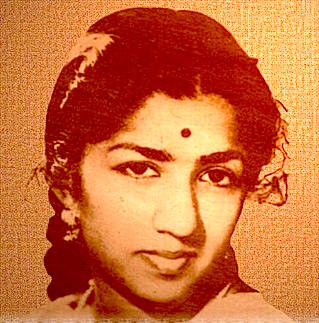
Razia Sultan Jalâlat-ud-Dîn Raziyâ (Raziya al-Din)
1205 – 1240 CE
Daughter of a Turkish slave who rose to become a sultan and the only woman to rule the Delhi Sultanate before or since; Razia devoted her rule to helping her people and established many libraries, research centers, and schools that went far beyond purely Islamic studies and included ancient philosophies, science, astronomy, and literature. Abandoning the veil, she was just, tolerant, and on religious matters emphasized the sense over the words, the spirit as more important than dogmatic belief. Her romantic love affair with Altunia is still famous and her inspiration continues in modern movies and TV shows.

Rumi مولانا جلالالدین محمد بلخی (Rumi Mawlānā Jalāl ad-Dīn Muḥammad Balkhī)
1207 – 1283 CE
Sufi mystic, Afghan hero, Sunni scholar-theologian, and one of the most widely read poets in the United States; Rumi went beyond religious, cultural, and ethnic borders to become a bridge between Shia and Sunni Muslims, East and West, between many of the world’s religions and cultures. Always a strong voice for peace, harmony, and understanding; he composed what’s considered the greatest poem written in the Persian language. While fleeing from a Mongol invasion with his family and during later journeys, he encountered many poetic and spiritual influences that transformed his conventional life of a scholar and jurist into an ascetic teacher who used music, poetry and dance to communicate the highest wisdom.
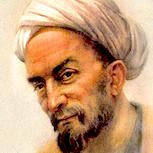
Saadi Shiraz سعدی شیرازی
1210 – 1292 CE
One of the greatest Persian poets and literary influences in medieval times and an influence on the West through people like Goethe, Hegel, Pushkin, and Barack Obama; Saadi - with a Zen-like approach similar to the great Tibetan teacher, Marpa - blended a mystical Sufi realization with a practical traveling merchant lifestyle. Escaping the hardship and poverty of his Baghdad youth, he traveled widely for 30 years including 7 years of imprisonment enslaved to hard labor. He then wandered 20 more years during the Mongol invasions mingling with ordinary people, bandits, refugees, spiritual teachers and farmers translating their experiences into poetry and wisdom teachings.
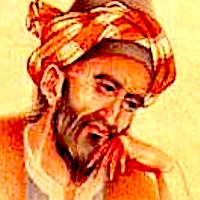
Hafiz خواجه شمسالدین محمد حافظ شیرازی (Hafez, Shams-ud-Dīn Muḥammad)
1315 – 1394 CE
Inspiring friend to the true and free human spirit
Mystic poet, “tongue of the invisible,” living oracle, “a poet for poets,” one of the world’s best spiritual friends and guides; Hafiz wrote poems that dissolve the walls separating people from each other, from nature, and from sacred awareness. For centuries readers in the Persian world have used him as a kind of I Ching or astrology to find practical, personal, and wise advice for the quandaries of daily life. Even Queen Victoria is rumored to have used his poems in this way. Although a Sufi in the Islamic traditions, Hafiz obviously goes far beyond and kind of sectarian fixation and exposes a true realization of universal truth, the perennial philosophy, and authentic, sacred-world living.
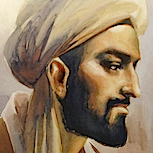
Ibn Khaldun أبو زيد عبد الرحمن بن محمد بن خلدون الحضرمي
1332 – 1406 CE
One of the world’s greatest political theorists, considered one of the greatest philosophers of the Middle Ages, a founding father of modern economic theory, sociology, and demography; Ibn Khaldun was a a North African Arab historian who defined government as "an institution which prevents injustice other than such as it commits itself" and taught that government is a necessary evil that should be constrained to a minimum. Toynbee described his writing as “the greatest work of its kind that has ever yet been created by any mind in any time or place” and his influence is still strong throughout the world.
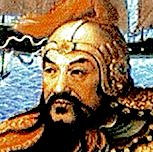
Zheng He 鄭和
1371 – 1435 CE
Emperor Zhu Di’s closest advisor, over 100 kg, over 2 meter tall formidable eunuch soldier, and famous Muslim explorer; Zheng He and the other admirals he trained in ships 4-5x bigger than Columbus’s sailed through the Strait of Magellan 98 years before Magellan, up and down the North American coasts 70 years before Columbus, surveyed the Arctic polar region and Antarctica 400 years before Europeans, Australia 300 years before Captain Cook, and rounded the Cape of Good Hope 66 years before the Portuguese Dias. Modern scholars credit him with "reshaping Asia" and propose that all of 15th century naval history was basically his story and the consequences of his voyages. Commanding a fleet of over 2000 ships carrying libraries of over 11,000 books to share information and technology with the rest of the world, Zheng He’s legacy is little known but one of the most influential in all history.
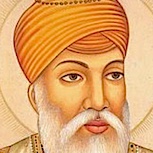
Kabīr कबीर
1399 – 1448 CE
Formidable iconoclast and deeply spiritual but anti-religious leader, a simple weaver but greatest poet of his time and place; Kabīr was born and raised as a Muslim, studied with a Hindu guru, became critical of both traditions, was physically threatened by both and after he died revered and claimed by both. From his background of a Muslim father and Hindu mother, he worked tirelessly to unite both traditions with a wisdom beyond their sectarian views. An important influence on Guru Nanak and the founding of Sikhism, his poetry and wisdom continue today in mainstream Indian film, folk songs, and even progressive rock.
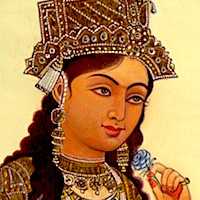
Mumtaz Mahal ممتاز محل
1593 – 1631 CE
Inspiration for building the Taj Mahal and wife of Genghis Khan descendent, emperor Shah Jahan; Mumtaz Mahal helped guide the nation while having 14 children in 19 years. She influenced her husband to forgive enemies, commute death sentences, and to help the poor. She also patronized artists, poets, theologians, and scholars often even providing pensions to their daughters. The Taj Mahal built as a tomb for her and described as one of the Wonders of the World and "the most beautiful building ever erected" was built facing south with the shape of a Mongul yurt.
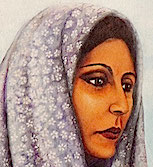
Táhirih طاهره (Fatimah Baraghani, "The Pure One")
1814 – 1852 CE
A genius-deep and curious mind living in a culture and with a husband who didn’t think women should read, be seen, or think for themselves; beautiful, educated, and from one of the most prominent families of her time, Tahirih is said to be the first woman to unveil and question Islamic political and religious orthodoxy which led to her imprisonment and execution. She rose above immense obstacles and became a famous poet, philosopher, and religious leader inspiring and organizing women to reject their oppression. “The first woman suffrage martyr,” her poems are still popular and her influence on Bábí, Bahá’í, and women’s rights are immense and continuing to this day.
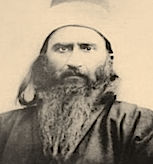
Bahá'u'lláh بهاء الله, ("Glory of God")
1817 – 1892 CE
Founder of the Bahá'í Faith, persecuted, tortured, exiled and imprisoned for 40 years, considered a manifestation like Moses, the Buddha, Jesus and Muhammad; Bahá'u'lláh continued and expanded a tradition that had broken from Islam and started a new religion based on a Shambhala-like myth of a hidden good rising up in the future to overcome corruption and evil to establish a great golden age. He taught the unity of all mankind, all genuine religions, the equality of men and women, the compatibility of science and religion and that it is time now to create a global society with universal education, a bill of rights, respect for diversity, a democratically elected world government and collective security based on justice and equality with a world police force, language and currency.
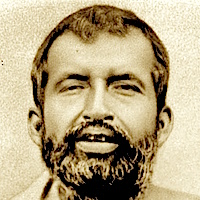
Ramakrishna
1836 – 1886 CE
Ramakrishna Paramahamsa (Bengali: রামকৃষ্ণ পরমহংস (1836 – 1886)
Indian mystic, yogi, inspiration for the 19th–20th century Bengali Renaissance; Ramakrishna became a strong revitalizing influence on Indian culture. His "social service gospel,” disciples like Vivekananda, and organizations do major philanthropic work in education, health care, disaster relief, rural management, and in eliminating tribal welfare. Steeped in Hindu philosophy and practices, he also initiated into and practiced Islam and did the same with Christianity teaching ‘All religions as true.’ His impact on thought leaders extended from names like Gandhi and Nehru to westerner ones like Tolstoy, Dvorak, and Philip Glass.
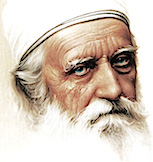
Abdu’l-Bahá' ' عبد البهاء
1844 – 1921 CE
Left in poverty and exile at 8 years old when his father, Bahá'u'lláh (founder of the Bahá'í faith), was imprisoned and all his family’s possessions looted; Abdul Baha grew up in a Palestinian prison colony and after 40 years of imprisonment at age 64 was released giving him the opportunity to more effectively spread these teachings of social service, racial and gender equality, environmental protection and a universal unification of religion, politics, science and government. He was knighted by the British government for his humanitarian work during WWI and today Bahá'í has grown to over 8 million followers, become the world’s fastest growing religion during the last 100 years, the second-most geographically widespread religion after Christianity growing at least twice as fast as the population of almost every UN region.
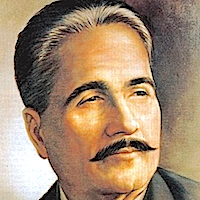
Muhammad Iqbal محمد اقبال
1877 – 1938 CE
Muhammad Iqbal محمد اقبال (1877 – 1938)
"Spiritual father of Pakistan,” politician, "Poet of the East,” scholar, ‘Sage of the Ummah,”and one of the most important figures in all of Urdu literature; Muhammad Iqbal was knighted by King George and praised by US Supreme Court Associate Justice William O. Douglas though also condemned by Western leaders because of his anti-capitalist views. In 1930 he proposed the creation of a Muslim state in Northwest India, and is now considered the ideological founder of Pakistan as well as a main inspiration for the Iranian Revolution. Fighting hard against racial, religious, national social and all forms of oppression, inequality, and discrimination; he promoted democracy, humanism, peace and friendship.

Inayat Khan
1882 – 1927 CE
Grandson of famous musician and “Beethoven of India,” Ustad Maula Bakhsh and married to the cousin of Christian Science founder Mary Baker Eddy; Inayat Khan joined together esoteric mysticism with the magic of music and brought Sufism to the West. He warned against any blind belief systems and inspired visions of beauty, harmony and love. He taught that nature is the only holy book, self-realization the only truth, “unswerving progress in the right direction” the only religion, and all the children of earth our only true family. He traveled widely spreading his vision of seeing through the identifications separating people and harmonizing the East and the West.
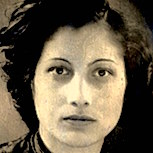
Noor Inayat Khan
1914 – 1944 CE
Daughter of the famous musician and teacher, Hazrat Inayat Khan who brought Sufism to the West; Noor was a skilled musician, studied medicine, and wrote children’s books. She became a hero to allied forces fighting against Nazi Germany in WWII and was given the George Cross, one of Britain's highest awards for bravery as well as a French Croix de Guerre. She followed her father’s teachings on non-violence but because of Hitler’s threat to Europe joined the British Air Force and then a secret British espionage group. She was the first woman spy to infiltrate occupied France and was later betrayed, captured, refused to cooperate or give information and was executed in a concentration camp.
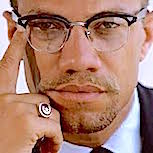
Malcolm X الحاجّ مالك الشباز
1925 – 1965 CE
One of the most influential African Americans in all history, human rights activist, Sunni Muslim minister, the main inspiration behind “Black is Beautiful” sub-cultural esteem building, reconnection to African heritage, and the Black Power movement; Malcolm X grew up an orphan and was soon in jail where he joined the Nation of Islam and soon became its’ public face and one of its’ main leaders. He helped many good causes including a drug rehabilitation program but became disillusioned with the group’s black supremacist and anti-integration stand. He opposed both white and black racism making him a target for both groups leading to his assassination by Nation of Islam extremists.
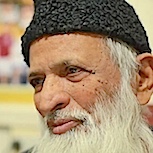
Abdul Sattar Edhi عبدالستار ایدھی
1928 – 2016 CE
Pakistan's "Father Teresa"
Called the “Father Teresa” of Pakistan, “Angel of Mercy,” and “the world's greatest living humanitarian;” Abdul Sattar Edhi was a philanthropist and social activist who dedicated his life to helping the poor. National hero and one of Pakistan’s most respected people, he established the world’s largest ambulance service and his country’s largest welfare organization that has trained 40,000+ nurses, rescued 20,000+ abandoned babies, operates orphanages, clinics, shelters, rehab centers for drug addicts and the mentally ill, and works in Africa, eastern Europe, the middle East and even the USA.
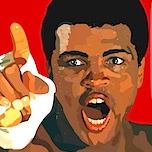
Muhammad Ali (Cassius Clay)
1942 – 2016 CE
Many easy accolades for Mohammad Ali but maybe the best is “A Muslim who put friendship and other people over dogma and belief.” A true citizen of the world, musician, poet, actor, political commentator, Civil Rights leader, counterculture icon, one of the most famous and celebrated sports figures of all time; he was arrested, convicted of draft evasion, mired in a Supreme Court trial but still became the only three-time lineal world heavyweight champion and the only boxer to be named Fighter of the Year five times. Graduating high school # 376 in a class of 391, he received an honorary doctorate from Princeton University. He actively supported Native American rights, the Palestinians, Israelis, poverty alleviation in Africa, peace in Iraq, and numerous philanthropic projects.
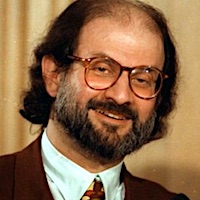
Salman Rushdie
1947 CE –
Fearless antagonist of Islamic fundamentalism
Prolific, award-winning, and fearless writer, Rushdie’s novels combine magical realism with historical fiction and concentrate on the interplays between Western and Eastern civilization. An antagonist of religious extremism and advocate for Islamic reform, his books were banned in many Muslim countries, he was put on an Al-Qaeda hit list, and the spiritual leader of Iran—Ayatollah Khomeini—issued a fatwā ordering his execution. When knighted on the English Queen’s birthday in 2007, mass demonstrations against him broke out in Malaysia and Pakistan while many Muslims campaigned publicly for his death. He supported Barack Obama’s election and the UK vote to stay in the EU, criticizes the Republican Party, champions ways to end racial discrimination, and actively supports feminism.
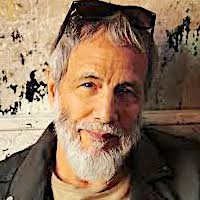
Cat Stevens (Steven Demetre Georgiou, Yusuf Islam)
1948 CE –
Singer-songwriter, musician, humanitarian, and brave artist dedicated to principle over fame and fortune; Cat Stevens had a Greek Orthodox father, a Baptist mother, went to a Catholic school, wrote an album based on a famous Zen teaching, converted to Islam and abandoned his musical career for 30 years. He used his music-derived wealth to promote Muslim philanthropic and educational causes and continues to help famine victims in Africa and thousands of orphans and families in the Balkans, Indonesia, and Iraq. Although always condemning terrorism and Islamic extremism, he was deported by Israel and ironically after the 9/11 attacks while on a tour with Dolly Parton promoting the song Peace Train; he was put on a US No-Fly list, briefly detained, and forced to fly back to the UK. Today he still continues his musical, philanthropic, and peace-making work.
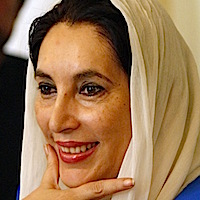
Benazir Bhutto بينظير ڀُٽو;
1953 – 2007 CE
“Iron Lady,” 11th Prime Minister of Pakistan, first woman to head a Muslim majority nation; Benazir Bhutto studied at Harvard in the USA and Oxford in the UK, became a symbol of women's empowerment in Islamic countries as well as a small but bright light shining on the possibility of peace between Islam and the West, democracy in Muslim countries, and the ending of Islamic extremism. Assassinated but now honored by the Pakistani government, her legacy includes almost all Pakistani political parties allowing women full participation in their organizations and elections, support programs for the poorest Pakistanis, and inspiration for young activists like Malala Yousafzai.
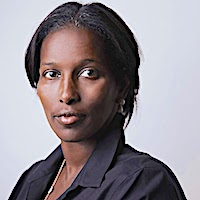
Ayaan Hirsi Ali
1969 CE –
Powerful voice for Islamic reform
Politician, scholar, powerful and effective voice advocating Islamic reform and the rights of Muslim women; Ayaan Hirsi Ali skillfully opposes the far-too-common practices of forced and child marriage, genital mutilation, and violence against women. After growing up as a devout Muslim, she abandoned her faith and became an insightful critic of Islam and the fundamentalist Islamic laws that oppress women. Her movie Submission precipitated an intense reaction of criticism, death threats, and the murder of her co-filmmaker. Both exemplifying and calling for an Islamic Enlightenment, she exposes the deep and debilitating oppression ingrained in Muslim culture and religion as well as articulating and demonstrating a path toward positive reform.
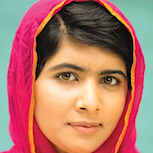
Malala Yousafzai ملالہ یوسفزئی
1997 CE –
Malala Yousafzai ملالہ یوسفزئی (1997 - )
Pakistani activist, the youngest Nobel Prize laureate at 17, "the most famous teenager in the world,” and listed by Time magazine 3 times as one of the world’s most influential people; Malala grew up in a the Swat Valley where the girls were banned from schools. Working hard for the education of women around the world, she was shot by a Taliban assassin in 2012 but thena group of 50 leading Muslim clerics issued a fatwa against the people who tried to kill her. Her book was banned by a 152,000-member Pakistan School Federation and though she is still broadly criticized in Pakistan for being too pro-Western; she didn’t hesitate when meeting with President Barack Obama and his family to challenge the use of drone strikes.
Related Sources (1 sources)
Ecclesiastes קֹהֶלֶת by Koheleth
Quotes about the Islamic Lineage (28 quotes)
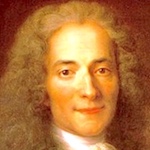
“Your religion, although it has some good points, such as worship of the great Being, and the necessity of being just and charitable, is otherwise nothing but a rehash of Judaism and a tedious collection of fairy tales. If the archangel Gabriel had brought the leaves of the Koran to Mahomet from some planet, all Arabia would have seen Gabriel come down : nobody saw him; therefore Mahomet was a brazen impostor who deceived imbeciles.”
Comments: Click to comment

“Christians tricked, hated, excommunicated, condemned, and denounced each other because of unintelligible, minute differences in dogma that no one could understand. And that’s why they slaughtered each other over and over again.”
Comments: Click to comment
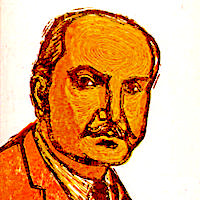
“Christianity persecuted, tortured, and burned. Like a hound it tracked the very scent of heresy. It kindled wars and nursed furious hatred and ambitions. Like Islam, it sanctified extermination and tyranny. All this would have been impossible if, like Buddhism, it had looked only to peace and the liberation of souls.”
Comments: Click to comment
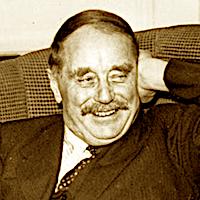
“Politically, Islam was not an advance but a retrogression from the traditional freedoms and customary laws of the desert... it's master has always been whatever man was vigorous and unscrupulous enough. Subject to revolts and assassinations, its final law has always been that man's will.”
Comments: Click to comment

“The very real spirit of democracy (using the word in its modern sense) pervades the essential teaching of Islam but Mohammad left no effective form to express this and his own rule was unlimited autocracy, and autocratic Islam has remained.”
Comments: Click to comment

“Contact with the Mohammedans in Spain, and to a lesser extent in Sicily, made the West aware of Aristotle; also of Arabic numerals, algebra, and chemistry... words we derive from Arabic such as: algebra, alcohol, alchemy, alembic, alkali, azimuth, zenith.”
Comments: Click to comment

“Arabic philosophy is not important as original thought… Mohammedan civilization in its great days was admirable in the arts and an many technical ways, but it showed no capacity for independent speculation in theoretical matters. It’s import—which must not be underrated—is as a transmitter.”
Comments: Click to comment
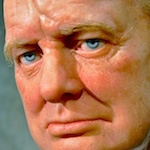
“But the Mohammedan religion increases, instead of lessening, the fury of intolerance. It was originally propagated by the sword, and ever since, its votaries have been subject, above the people of all other creeds, to this form of madness... The forces of progress clash with those of reaction. The religion of blood and war is face to face with that of peace.”
Comments: Click to comment

“But the Mohammedan religion increases, instead of lessening, the fury of intolerance. It was originally propagated by the sword, and ever since, its votaries have been subject, above the people of all other creeds, to this form of madness... The forces of progress clash with those of reaction. The religion of blood and war is face to face with that of peace.”
Comments: Click to comment

“Upon Judaism, Zoroastrianism, and his native creed, Muhammad built a religion simple and clear and strong, and a morality of ruthless courage and racial price, which in a generation marched to 100 victories, in a century to empire, and remains to this day a virile force throughout half the world.”
Comments: Click to comment

“For five centuries, from 700 to 1200, Islam led the world in power, order, and extent of government, in refinement of manners, in standards of living, in humane legislation and religious toleration, in literature, scholarship, science, medicine, and philosophy.”
Comments: Click to comment

“The Islamic conquest of India is probably the bloodiest story in history. It is a discouraging tale, for its evident moral is that civilization is a precious good, whose delicate complex of order and freedom, culture and peace, can at any moment be overthrown by barbarians invading from without or multiplying within.”
Comments: Click to comment
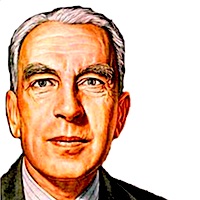
“The Mahometans, according to the principles of their faith, are under an obligation to use violence for the purpose of bringing other religions to ruin; yet they have been tolerating other religions for some centuries. The Christians have not been given orders to do anything but preach and instruct; yet they have been exterminating by fire and sword all those who are not of their religion... Christians enjoy the fine advantage of being far better versed than they are in the art of killing, bombarding, and exterminating the Human Race.”
Comments: Click to comment
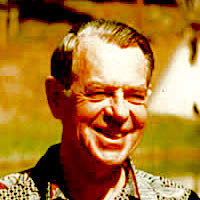
“The idea of the supernatural as being something over and above the natural is a killing idea. In the Middle Ages this was the idea that finally turned that world into something like a wasteland, a land where people were living inauthentic lives, never doing a thing they truly wanted to because the supernatural laws required them to live as directed by their clergy.”
Comments: Click to comment
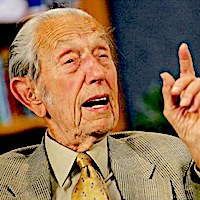
“Islam is now Wrestling with Western thought as it once wrestled with Greek philosophy, and is as much in need as it was then of a 'revival of the religious sciences'. Deep study of al-Ghazali may suggest to Muslims steps to be taken if they are to deal successfully with the contemporary situation. Christians, too, now that the world is in a cultural melting-pot, must be prepared to learn from Islam, and are unlikely to find a more sympathetic guide than al-Ghazali.”
Comments: Click to comment

“What provides Islam its vitality is not just that Muslims find the Quran still endlessly interpretable but that they cannot stop interpreting... Muslims insist that the Quran, to be understood, cannot be translated”
Comments: Click to comment

“The rise of Islam offers perhaps the most impressive example in world history of the power of words to alter human behavior in sudden, surprising ways.”
Comments: Click to comment
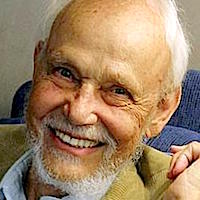
“Of all the non-Western religions, Islam stands closest to the west—closest geographically, and also closest ideologically; for religiously it stands in the Abrahamic family of religions while philosophically it builds on the Greeks. Yet Islam is the most difficult religion for the West to understand... Common borders have given rise to border disputes... for a good part of the last 1400 years, Islam and Europe have been at war, and people seldom have a fair picture of their enemies.”
Comments: Click to comment

“Whereas the entire meaning of the Quran must easily be interpreted by the lives of Muslims, Islam's followers abandoned its essence.”
Comments: Click to comment
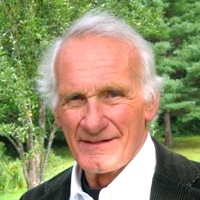
“It is not necessary for infinite players to be Christians; indeed it is not possible for them to be Christians... Neither is it possible for them to be Buddhists, or Muslims, or atheists, or New Yorkers... All such titles can only be playful abstractions”
Comments: Click to comment
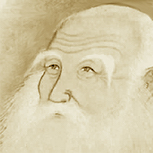
“Disappointment, poverty, suffering, and despair create a fertile planting mix for religious and political extremism. The more desperation people find themselves in, the more welcoming they become to promises of salvation. The more degraded the conditions we find ourselves here on earth, the more appeal we have for visions of heavenly perfection. Perhaps having the most vivid and pleasurable description of heavenly bliss described by a political or religious dogma; the more attractive to poverty-stricken, despairing populations. This could explain the rapid growth and power of the Catholic Church during the Middle Ages, of Islamic extremism in today’s world.”
Comments: Click to comment

“Religious totalitarianism has caused a deadly mutation in the heart of Islam and we see the tragic consequences in Paris today.”
Comments: Click to comment

“What is needed is a move beyond tradition, nothing less than a reform movement to bring the core concepts of Islam into the modern age, a Muslim Reformation to combat not only the jihadist ideologues but also the dusty, stifling seminaries of the traditionalists, throwing open the windows to let in much-needed fresh air.”
Comments: Click to comment
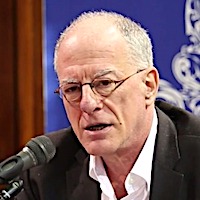
“Islamism is a modern, instead of an ancient, political tendency, which arose in a spirit of fraternal harmony with the fascists of Europe in the 1930s and '40s.”
Comments: Click to comment

“Islam, as it is currently understood and practiced by vast numbers of the world's Muslims, is antithetical to civil society.”
Comments: Click to comment

“Islam is part religion, and part a political-military doctrine. The part that is a political doctrine contains a world view, a system of laws and a moral code that is totally incompatible with our constitution, our laws, and our way of life.”
Comments: Click to comment
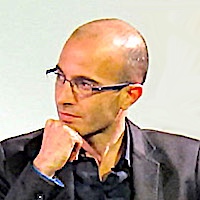
“It is particularly ironic when Christian leaders such as Barack Obama have the temerity to tell self-professing Muslims like Abu Bakr al-Baghdadi what it means to be Muslim... Islam has no fixed DNA. Islam is whatever Muslims make of it.”
Comments: Click to comment

“When I think of the mystery of existence, I prefer to use other words, so as to avoid confusion. And unlike the God of the Islamic State and the Crusades – who cares a lot about names and above all about His most holy name – the mystery of existence doesn’t care an iota what names we apes give it.
Comments: Click to comment
Comments (0)